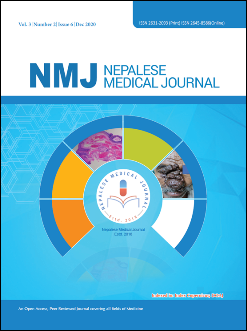Effect of Dietary Intervention Using Low-Carbohydrate Diet to Manage Newly Diagnosed Type 2 Diabetes Mellitus in TUTH Hospital, Nepal
DOI:
https://doi.org/10.3126/nmj.v4i1.34710Keywords:
Low-carbohydrate diet; HbA1c; Diabetes MellitusAbstract
Introduction: Low-carbohydrate diet is effective in improving blood glucose parameters, glycated hemoglobin A1c, weight, and waist circumference. The effectiveness of this diet is well accepted in America and the United Kingdom but in Nepal due to many preexisted misbeliefs regarding carbohydrates, we still have a carbohydrate-based diet for type 2 diabetes mellitus.
Material and Methods: Fifty-four newly diagnosed type 2 diabetes mellitus without any treatment were selected for solely low-carbohydrate diet intervention (<130g carbohydrate) in the endocrinology unit of Tribhuvan University Teaching Hospital, Kathmandu from March to August 2019. Antidiabetic medications were not used. Individualized diet plans and repeated counseling were given and followed for 3 months. Blood glucose (fasting and postprandial),
glycated hemoglobin A1c, weight, and waist circumference were compared at entry and 3 months. Statistical analysis was done using SPSS version 21.
Results: The mean ± SD age was 44.77 ± 10.32. The mean body weight decreased by 4.52 ± 1.79 kg (p<0.001), mean waist circumference decreased by 7.85±0.72 cm (p<0.001), mean fasting blood glucose decreased from 10.44±3.52 mmol/L to 6.18±1.02 mmol/L (p<0.001), mean postprandial blood glucose decreased from 16.76±8.26 mmol/L to 8.26±1.66 mmol/L (p<0.001) and mean glycated hemoglobin A1c decreased by 2.38 ± 1.49 % (p<0.001) after 3
months of low-carbohydrate diet intervention.
Conclusions: The use of a low-carbohydrate diet may effectively produce glycemic control and decrease glycated hemoglobin A1c without medication in newly diagnosed type 2 diabetes mellitus. Additionally, this diet may also help to lower weight and waist circumference in newly diagnosed type 2 diabetes mellitus.
Downloads
Downloads
Published
How to Cite
Issue
Section
License
Copyright (c) 2021 Aarem Karkee, Samir Singh

This work is licensed under a Creative Commons Attribution 4.0 International License.
This license enables reusers to distribute, remix, adapt, and build upon the material in any medium or format, so long as attribution is given to the creator. The license allows for commercial use.
Copyright on any article published by Nepalese Medical Journal is retained by the author(s).
Authors grant Nepalese Medical Journal a license to publish the article and identify itself as the original publisher.
Authors also grant any third party the right to use the article freely as long as its integrity is maintained and its original authors, citation details and publisher are identified.




